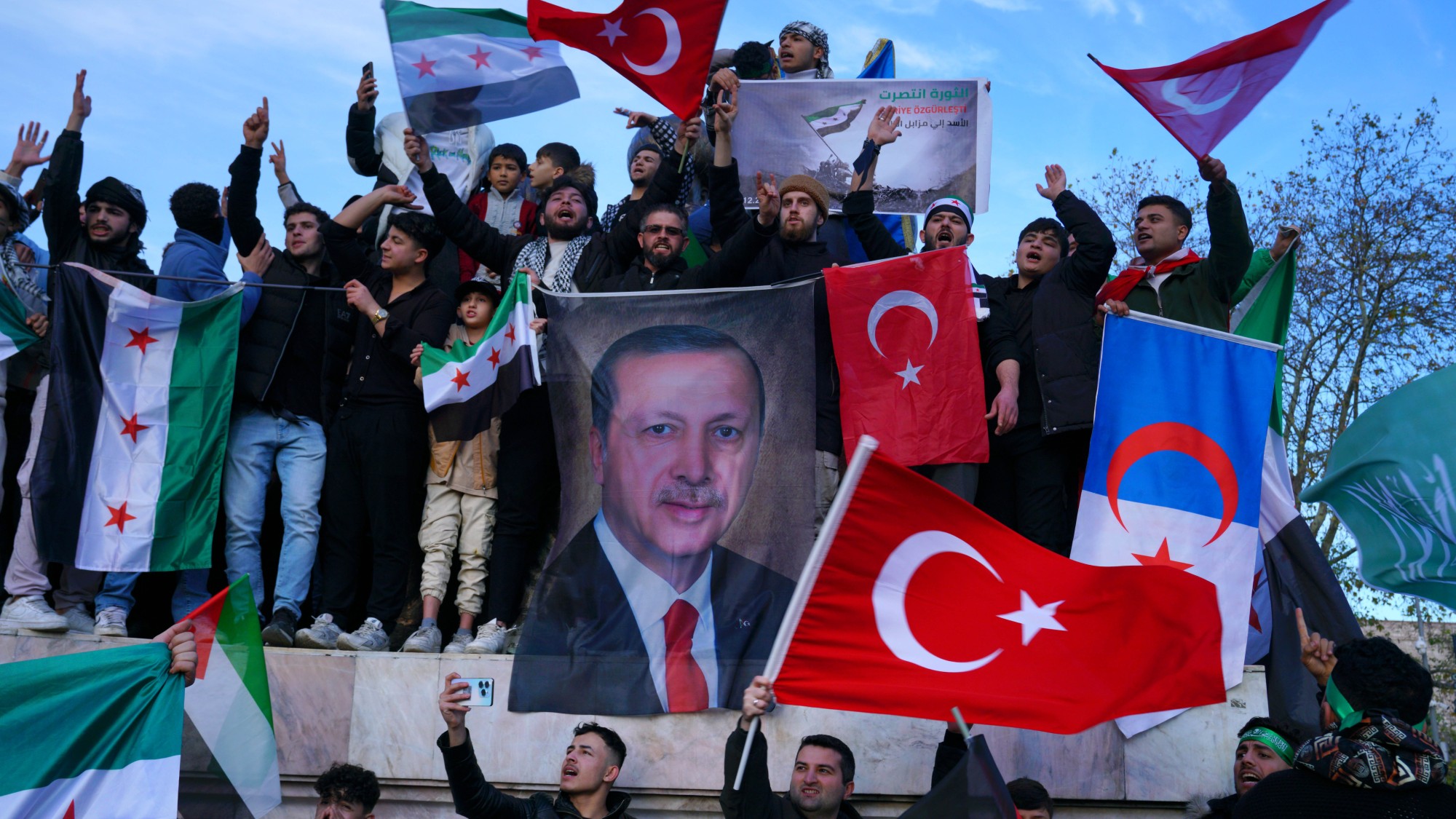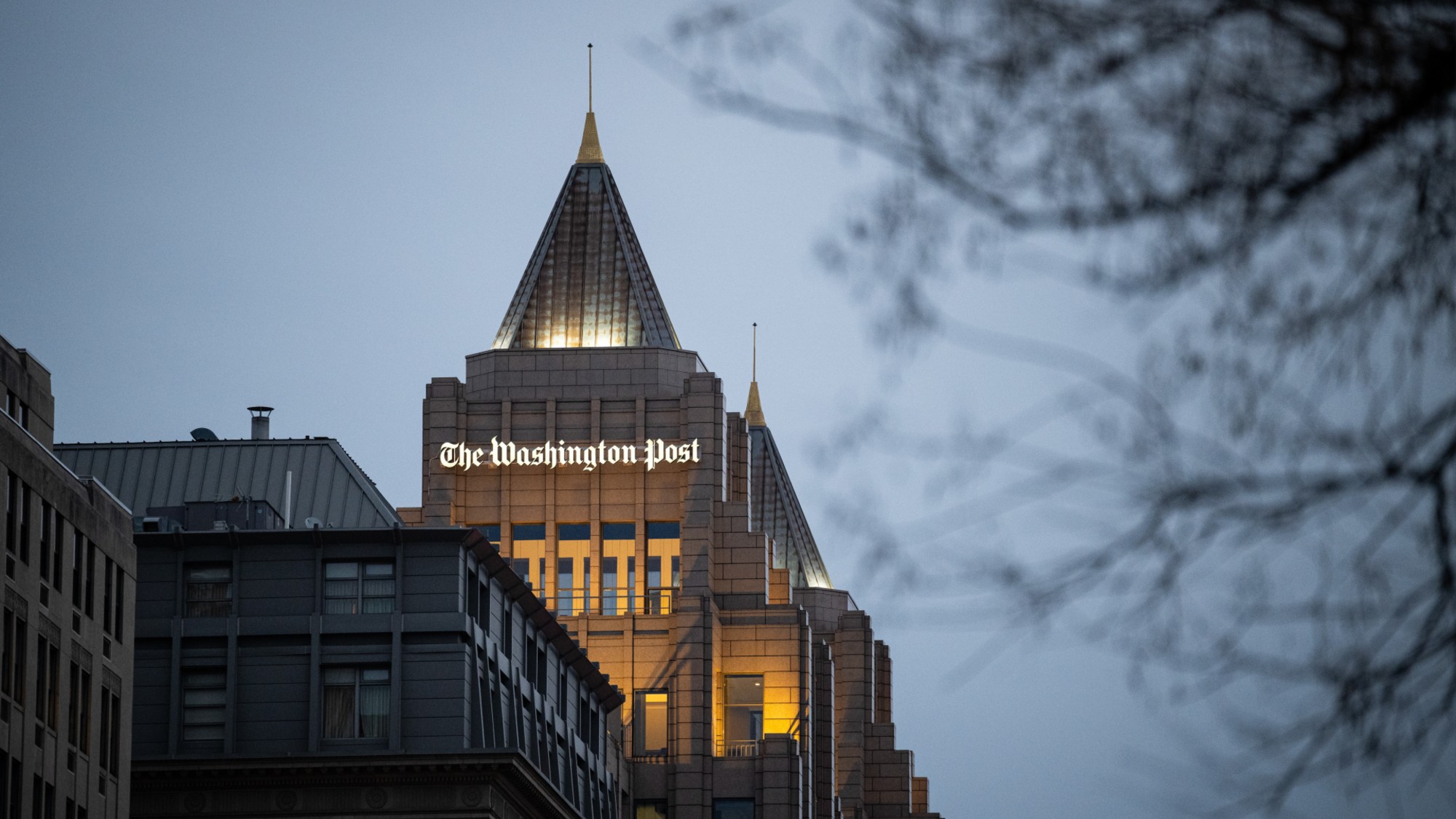What Assad's fall means beyond Syria
Russia and Iran scramble to forge new ties with Syrian rebels as Israel seeks to exploit opportunities and Turkey emerges as 'main winner'

A free daily email with the biggest news stories of the day – and the best features from TheWeek.com
You are now subscribed
Your newsletter sign-up was successful
Foreign Secretary David Lammy has said the toppling of Bashar al-Assad in Syria was a "humiliation" not just for the deposed president himself, but for the Russian and Iranian regimes who supported him.
No decision has yet been made on whether the UK government will remove Hayat Tahrir al-Sham (HTS), the rebel group that toppled the old regime, from a list of banned terrorist groups, said the BBC. But with the Middle East facing a moment of reckoning, it is not just Britain that is scrambling to adjust to the new post-Assad era.
Russia
The fall of Assad is undoubtedly a significant "blow to Russia's prestige", said the BBC's Russia editor Steve Rosenberg. It will also have wider strategic and military consequences for Moscow.
The Week
Escape your echo chamber. Get the facts behind the news, plus analysis from multiple perspectives.

Sign up for The Week's Free Newsletters
From our morning news briefing to a weekly Good News Newsletter, get the best of The Week delivered directly to your inbox.
From our morning news briefing to a weekly Good News Newsletter, get the best of The Week delivered directly to your inbox.
In return for its support in shoring up the regime during the decade-long civil war, Syrian authorities awarded Russia 49-year leases on the air base in Hmeimim and naval base in Tartous, giving Moscow an "important foothold in the eastern Mediterranean".
The liberation of Damascus "reflects a likely catastrophic loss of Russia's significant investment in the Assad regime", said R. Clarke Cooper, senior fellow at the Atlantic Council. Losing the two military bases would "damage Moscow's ability to manoeuvre in Africa and the Mediterranean", which may in turn "have a strategic impact on Russian influence across the world".
Iran
Assad's fall may have come as a shock to the international community, but perhaps not its closest ally in the Middle East. Iran had "lost faith" in Assad well before his fall from power, and had refused to send more forces to support his faltering regime, said the Financial Times.
Like Moscow, Tehran has been quick to open up a "direct line of communication" with rebels in Syria, said Reuters. But there is also "little doubt" it remains hugely concerned "about how the change of power in Damascus will affect Iran's influence in Syria, the lynchpin of its regional clout".
A free daily email with the biggest news stories of the day – and the best features from TheWeek.com
For many, the end of Assad marks the final nail in Iran's much-vaunted "Axis of Resistance" that informally united Syria and armed groups like Hamas, Hezbollah in Lebanon, Yemen's Houthi rebels and a number of smaller groups in Iraq.
Syria's leading rebel faction, the Sunni Islamist HTS, may not seem a "natural partner" for the Shi'ite Iranian regime, said Haaretz, but geopolitical interests, especially in the Middle East, are a "dynamic, flexible concept that depends on utility and necessity. And if Syria doesn't find solutions to its needs elsewhere, Iran might well become the address."
Israel
Israel's Prime Minister Benjamin Netanyahu has claimed credit for the Syrian uprising that toppled Assad, calling it "the direct result of our forceful action against Hezbollah and Iran".
He may have anticipated this outcome or at least hoped for it, David Rigoulet-Roze, from the French Institute for International and Strategic Affairs, told France 24, but it does not come without significant risks for Israel.
The Economist said that, until last week, Israel's "long-standing strategy had been to rely on Assad to maintain the tense peace on the border and not to allow Syria to become another launching-pad for attacks on Israel".
Now that he is gone, "Israel's main concern, aside from the regime's strategic weapons falling into hostile hands, is chaos in Syria that would allow organisations affiliated with Iran to launch rockets and drones".
Sensing both a threat and an opportunity, Israel has wasted little time protecting its strategic interests. It has launched hundreds of air strikes on locations throughout Syria, destroying what Israeli military officials said were "strategic warehouses" containing chemical weapons as well as long-range missiles and anti-aircraft systems.
Israeli troops have also seized more territory in a buffer zone near the occupied Syrian Golan Heights, a move the UN said on Monday constituted a violation of a 1974 ceasefire agreement between Israel and Syria.
Turkey
If Russia and Iran have seen their influence diminished by the events of the past week then Turkey is the "main winner", said Seyed Hossein Mousavian, from Princeton University, in Middle East Eye.
Turkey has heavily backed HTS, which looks set to play a major role in any future Syrian government. With Assad finally gone, Ankara "may hope to resolve the Syrian refugee crisis in Turkey, exert more effective control over the Kurds and strengthen its role in the Palestinian issue, as well as cement alliances with like-minded groups in the region", said Mousavian.
The transition of power in Damascus is "set to reshape the balance of power in the region", said The Telegraph, with Turkey's President Recep Tayyip Erdogan "probably emerging as a major beneficiary".
Elliott Goat is a freelance writer at The Week Digital. A winner of The Independent's Wyn Harness Award, he has been a journalist for over a decade with a focus on human rights, disinformation and elections. He is co-founder and director of Brussels-based investigative NGO Unhack Democracy, which works to support electoral integrity across Europe. A Winston Churchill Memorial Trust Fellow focusing on unions and the Future of Work, Elliott is a founding member of the RSA's Good Work Guild and a contributor to the International State Crime Initiative, an interdisciplinary forum for research, reportage and training on state violence and corruption.
-
 Nuuk becomes ground zero for Greenland’s diplomatic straits
Nuuk becomes ground zero for Greenland’s diplomatic straitsIN THE SPOTLIGHT A flurry of new consular activity in the remote Danish protectorate shows how important Greenland has become to Europeans’ anxiety about American imperialism
-
 ‘This is something that happens all too often’
‘This is something that happens all too often’Instant Opinion Opinion, comment and editorials of the day
-
 House votes to end Trump’s Canada tariffs
House votes to end Trump’s Canada tariffsSpeed Read Six Republicans joined with Democrats to repeal the president’s tariffs
-
 ‘The mark’s significance is psychological, if that’
‘The mark’s significance is psychological, if that’Instant Opinion Opinion, comment and editorials of the day
-
 ‘Bad Bunny’s music feels inclusive and exclusive at the same time’
‘Bad Bunny’s music feels inclusive and exclusive at the same time’Instant Opinion Opinion, comment and editorials of the day
-
 Is the Gaza peace plan destined to fail?
Is the Gaza peace plan destined to fail?Today’s Big Question Since the ceasefire agreement in October, the situation in Gaza is still ‘precarious’, with the path to peace facing ‘many obstacles’
-
 ‘My donation felt like a rejection of the day’s politics’
‘My donation felt like a rejection of the day’s politics’Instant Opinion Opinion, comment and editorials of the day
-
 Trump’s ‘Board of Peace’ comes into confounding focus
Trump’s ‘Board of Peace’ comes into confounding focusIn the Spotlight What began as a plan to redevelop the Gaza Strip is quickly emerging as a new lever of global power for a president intent on upending the standing world order
-
 How Iran protest death tolls have been politicised
How Iran protest death tolls have been politicisedIn the Spotlight Regime blames killing of ‘several thousand’ people on foreign actors and uses videos of bodies as ‘psychological warfare’ to scare protesters
-
 The Board of Peace: Donald Trump’s ‘alternative to the UN’
The Board of Peace: Donald Trump’s ‘alternative to the UN’The Explainer Body set up to oversee reconstruction of Gaza could have broader mandate to mediate other conflicts and create a ‘US-dominated alternative to the UN’
-
 ‘It may portend something more ominous’
‘It may portend something more ominous’Instant Opinion Opinion, comment and editorials of the day